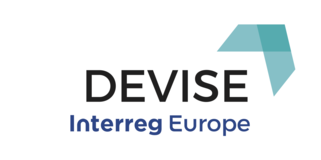This week we travel to Pays de la Loire (France) to discover the Regional Action Plan developed by our partners at Laval Mayenne Technopole.
Pays de la Loire has a central role in terms of supporting economic development and, therefore, supporting innovation. The region has a very strong proportion of SMEs. Compared to other French regions, Pays de la Loire’s production system is relatively diversified and has comparative advantages in certain key sectors: the naval and aeronautical industries, agriculture and agro-industry, plastics, insurance, leather and footwear industries and clothing. DEVISE partners have concluded a macro-analysis and a micro-analysis in order to check the relative position at national level in terms of digitalisation of businesses and specific digital challenges. In consequence, “a state of play has been established to identify the current stakes that DEVISE has to tackle and to better understand companies’ needs that this project will address”, explains Stéphane Langlais, Innovation Officer at LMT and DEVISE project partner.
LMT’s Action Plan is composed by 3 main actions:
Artificial Intelligence: to support companies to initiate and implement artificial intelligence uses and technologies. “Over the last few years, LMT has noticed that questions and interests of companies on the subject of AI have grown steadily”, states Langlais. According to him, many studies have constantly stressed the need for companies to take up these issues as soon as possible in order to take advantage of the opportunities linked to these technologies. “This is why we have already set up actions on this theme”, he adds.
To build this action, LMT got inspiration from a good practice from another DEVISE project partner: Fomento San Sebastian. It happened during a staff exchange held in February 2020 in San Sebastian: Gastronomia 4.0. “It helped us to better identify the expectations and needs of companies in terms of digital transformation”. They interviewed 30 local companies to understand their state of progress and their needs regarding digital issues, in order to design new support actions. “The discussions we had beforehand with our partner based in Spain were crucial to the success of this first step”, he highlights.
5x5 Digital: to create new digital projects through a design approach inspired by the 5x5 methodology from West Flanders. “This action is directly inspired by what we observed during the staff exchange in Belgium. Indeed, thanks to the visit organised by VoKa, we discovered the 5x5 action implemented in Kortrijk”. This action is the concrete result of the adaptation of a good practice presented in DEVISE, and the exchanges with the Belgian partner VoKA, the Chamber of Commerce of West Flanders, & one of its stakeholders, Howest - the University of Kortrijk.
French companies will have the opportunity to meet designers from the region who are tasked to develop concepts with the ideas generated during creativity sessions. At the end of the contest, the companies involved in the programme choose the designers they want to work with in order to continue the project. “Thanks to discussions we had with several stakeholders from our region, we decided to explore the possibility to work with design students having digital skills, in order to mobilise their fresh eyes on the projects and to allow them to apply their skills in a real situation”, concludes Langlais.
Tourism and digital: to initiate digital experiments in the tourism sector to help tackle the COVID-19 crisis consequences. During the DEVISE project staff exchange in San Sebastian, French stakeholders from Angers Tourism Lab discovered ‘Smartkalea’, a good practice led by Fomento San Sebastian project partner. It is an innovative programme that gathers public and private players with a common ambition: to make the city smarter & more sustainable in order to improve the quality of life of its citizens and benefit to local companies. It consists in leading experimentations that promote the uses of digital technologies and the environmental sustainability. “Easy to duplicate, we plan to refer to this good practice by adapting it to another sector: tourism. A first experimentation has already been initiated: it involves the use of immersive technologies in order to help people to discover touristic places, i.e., the Bioparc located in Doué-la-Fontaine, Mauges-sur-Loire’s bridge”, adds DEVISE partner. He explains that a second one is in progress. “It involves the installation of tools connected by Bluetooth on a hiking trail in order to use them as beacons for orientation”. Furthermore, a third experimentation will be held in 2021 after the selection of the winners of the call for proposals in March 2021. “Thanks to those experimentations, ICT will be used by early adopters involved in the programme, who will be able to attest the positive impacts caused by the integration of these technologies”, concludes Langlais.











